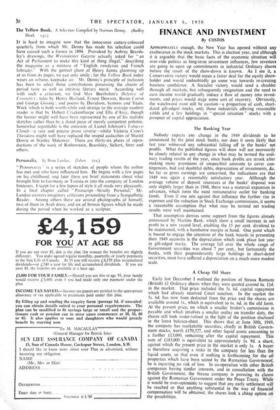FINANCE AND INVESTMENT
By CUSTOS
APPROPRIATELY enough, the New Year has opened without any exuberance in the stock markets. This is election year, and although it is arguable that the basic facts of the economic situation will over-ride politics as long-term investment influences, few investors are going to open up commitments in industrial Ordinary shares before the result of the show-down is known. As I see it, a Conservative victory would mean a fairer deal for the equity share- holder and would undoubtedly go some way towards re-creating business confidence. A Socialist victory would send a shudder through all markets, but subsequently resignation and the need to earn income would gradually induce a flow of money into invest- ments, and prices would stage some sort of recovery. Obviously, the watchword must still be caution—a proportion of cash, short- dated gilt-edged stocks, only those industrials offering reasonable yields and a few holdings in " special situation " stocks with a prospect of capital appreciation.
The Banking Year
Nobody expects any change in the 1949 dividends to be announced by the joint stock banks, nor does it seem likely that last year witnessed any substantial falling off in the banks' net profits. What the published figures will show will not necessarily be closely related to any change in what may be termed the ordi- nary trading results of the year, since bank profits are struck after making many provisions of unspecified amounts to cover con- tingencies, bad and doubtful debts, depreciation of investments, &c. So far as gross earnings are concerned, the indications are that 1949 was again a reasonably satisfactory year. Although the average volume of deposit resources at the banks' disposal was only slightly larger than in 1948, there was a material expansion in advances, which form the most remunerative outlet for banking funds. Even if one sets against that influence the further rise in expenses and the reduction in Stock Exchange commissions, it seems a reasonable assumption that what may be termed net trading results were well maintained.
That assumption derives some support from the figures already announced by Martins Bank, which show a small increase in net profit to a new record level, enabling the 15 per cent. dividend to be maintained, with a handsome margin in hand. One point which is bound to engage the attention of the bank boards in presenting their 1949 accounts is the depreciation which took place last year in gilt-edged stocks. The average fall over the whole range of Government securities was about 7 per cent., but fortunately the banks, with their preponderantly large holdings in short-dated securities, must have suffered a depreciation on a much more modest scale.
A Cheap Oil Share Early last December I outlined the position of Steaua Romana (British) £1 Ordinary shares when they were quoted around 6s. lid. in the market. That price included the 5s. 6d. capital repayment which had already received Court sanction. In the market the 5s. 6d. has now been deducted from the price and the shares are available around ls., which is equivalent to 6s. 6d. in the old form. At the present price, on which a smaller broker's commission is payable and which involves a smaller outlay on transfer duty, the shares still look under-valued in the light of the position disclosed in the latest balance-sheet. This shows that at June 30th, 1949, the company has marketable securities, chiefly in British Govern- ment stocks, worth £170,527, and other liquid assets amounting to a further £13,000, remaining after the capital repayment. This sum of £183,000 is equivalent to approximately is. 9d. a share, against which the present price in the market is only Is. A buyer is therefore acquiring a stake in the company for less than the liquid assets, so that even if nothing is forthcoming for the oil properties which have been seized by the Rumanian Government; he is incurring no risk of loss. In co-operation with other British companies having similar interests, and in consultation with the British Government, the Steaua company is pursuing its claims against the Rumanian Government under the Peace Treaty. While it would be over-optimistic to suggest that any early settlement will be reached or that anything substantial in the way of financial compensation will be obtained, the shares look a cheap option on the possibilities.






































 Previous page
Previous page